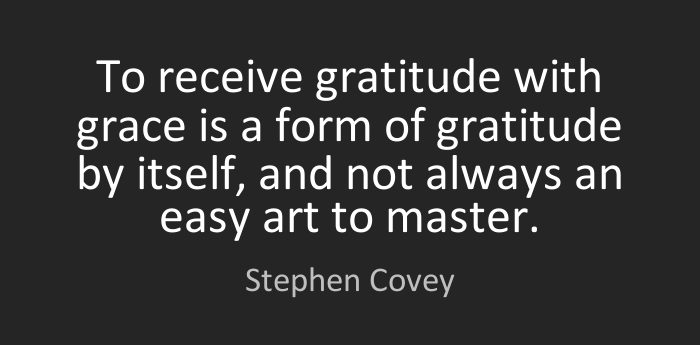
You have been guilty of this, or you know someone who has.
Somebody pays you a compliment or offers praise for something you’ve done.
You respond with, “Oh, it was nothing,” or “I was just doing my job,” or “It was a team effort.”
Women especially … are taught that to accept a compliment fully means that you are full of yourself.
How about this one? “I love your hat!”
You: “This old thing? At least it takes the attention away from my tired-looking face.”
I heard a story recently of a community leader who was being awarded for her work on behalf of diversity. The storyteller said this leader made a quick speech accepting the award, then deflected attention from herself and turned it into a fundraiser for minority students.
This is what prompted me to write this. I applaud this person’s effort to raise money for others. I am also present to her deflecting attention and the spotlight away from herself.
Why do women do this?
When someone is complimenting you, they have gone out of their way to say something nice to you. They didn’t have to do that. They want to share with you how your actions or behaviors impacted them and their lives. They are saying that they noticed a praiseworthy quality in you.
When you deflect or deny that praise, you’re basically contradicting them. You are saying that they don’t have good judgment, that they don’t know what they’re talking about. You’re returning their kind words with an insult. You’re not being modest, you’re being rude.
Here’s how you should respond. Every. Single. Time. “Thank you.”
That’s it. If you feel inclined to say more, don’t discredit yourself or deflect.
“Thank you. I’ll be sure to let Hannah and Ben know what you said. They worked just as hard on this project,” not, “It wasn’t me, it was the team.”
Or when somebody compliments your outfit, you say, “Thank you. I love it, too … it was a gift from my mom.”
Not, “This old thing? It makes me look fat.”
Being humble and gracious is one thing. Undervaluing yourself is another.
Think of receiving a compliment, praise, or an award like receiving a gift.
Somebody has carefully selected your gift, wrapped it beautifully, and presented it with excitement. You open the gift and tell them, “No, that’s not going to work for me. You should give it to someone else.”
If you say anything that resembles, “No, I’m not who you think I am,” or “I don’t deserve it,” you’ve rejected that nice gesture. Don’t make someone else feel rejected because of your own insecurities. You are hurting their feelings by denying your worthiness to accept the gift.
That’s what it is. Someone giving you recognition is like giving you a gift.
It doesn’t matter if you disagree with it or feel you don’t deserve it — it is someone else’s experience of you. Let them share that gift.
For women, this difficulty accepting praise can be traced back to lessons ingrained since childhood.
Girls are told, “Nobody likes a braggart.” Boys are told, “Show your stuff,” “Fight for what you want,” and “Tell the coach you can do it.”
This pattern and expectation becomes embedded into our psyche, and it can be damaging in personal and professional relationships.
It’s okay to let yourself feel proud of something you did well. It is possible to be modest, while still being grateful and gracious.
Some people complain that their contributions, hard work, and expertise aren’t recognized.
Yet many of deflect compliments, praise, and recognition — which discourages those who praise us from ever doing it again. There’s an expression, “Be careful how you speak about yourself because others will take you at your word.”
Inspirational speaker and author Steven Covey said it best, “To receive gratitude with grace is a form of gratitude by itself, and not always an easy art to master.”



